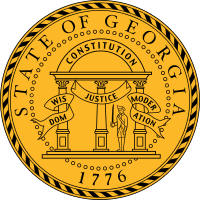April 22, 2019 •
Georgia Raises Contribution Limits
Last week, the Government Transparency and Campaign Finance Commission voted to raise contribution limits. For statewide elected offices the contribution limits raised from $6,600 to $7,000 for primary and general elections. Primary and general runoff elections limits were raised from […]
 Last week, the Government Transparency and Campaign Finance Commission voted to raise contribution limits.
Last week, the Government Transparency and Campaign Finance Commission voted to raise contribution limits.
For statewide elected offices the contribution limits raised from $6,600 to $7,000 for primary and general elections.
Primary and general runoff elections limits were raised from $3,900 to $4,100 for statewide elected offices.
Contribution limits for all other offices were also raised from $2,600 to $2,800 for primary and general elections and from $1,400 to $1,500 for primary and general runoff elections.
The previous contribution limits had not changed since 2016.
November 16, 2015 •
Georgia Announces Proposed Changes to Lobbying, Campaign Finance Rules
The Georgia Government Transparency and Campaign Finance Commission issued a notification of proposed changes to the Commission’s rules. New rules being considered deal with lobbying expenditures made to the family of a public official or employee, when campaign contributions are […]
 The Georgia Government Transparency and Campaign Finance Commission issued a notification of proposed changes to the Commission’s rules. New rules being considered deal with lobbying expenditures made to the family of a public official or employee, when campaign contributions are deemed received, and anonymous contributions.
The Georgia Government Transparency and Campaign Finance Commission issued a notification of proposed changes to the Commission’s rules. New rules being considered deal with lobbying expenditures made to the family of a public official or employee, when campaign contributions are deemed received, and anonymous contributions.
Rule amendments are also being considered to several sections of Chapter 189, including 189-1-.07 concerning adjustments of contribution limits based on inflation.
The Commission will consider the changes on December 15, 2015.
March 12, 2014 •
Georgia Lawmakers and Lobbyists Work with New Ethics Law
Georgia lawmakers and lobbyists are adapting new gift limits to old reporting methods while the ethics commission attempts to draft rules. House Bill 142 established the first-ever limit on lobbyist spending by capping the value of a gift a lobbyist […]

Georgia lawmakers and lobbyists are adapting new gift limits to old reporting methods while the ethics commission attempts to draft rules. House Bill 142 established the first-ever limit on lobbyist spending by capping the value of a gift a lobbyist could give a lawmaker at $75.
The bill, effective January 1, 2014, has several exceptions including one to remove the $75 cap for any caucus approved by the House or Senate ethics committees.
Once approved as a caucus, the members can accept a gift greater than $75 without everyone in a caucus attending a dinner, so long as the entire group is invited. Even before committee approval, delegations and more traditional caucuses began accepting expensive meals from lobbyists, leaving lobbyists to figure out how to disclose the spending.
The Georgia Government Transparency and Campaign Finance Commission is still months away from unveiling rules governing the new ethics law.
November 18, 2013 •
Georgia Lobbyist 2014 Renewals will be Denied for Outstanding Fines and Fees
Following the November 13, 2013 meeting, the Georgia Government Transparency and Campaign Finance Commission issued an order to deny lobbyist renewal for the calendar year of 2014 for each lobbyist with outstanding registration, supplemental registration, identification card, and/or badge fees. […]
 Following the November 13, 2013 meeting, the Georgia Government Transparency and Campaign Finance Commission issued an order to deny lobbyist renewal for the calendar year of 2014 for each lobbyist with outstanding registration, supplemental registration, identification card, and/or badge fees.
Following the November 13, 2013 meeting, the Georgia Government Transparency and Campaign Finance Commission issued an order to deny lobbyist renewal for the calendar year of 2014 for each lobbyist with outstanding registration, supplemental registration, identification card, and/or badge fees.
The commission will also deny lobbyist renewal for each lobbyist with unpaid fines or unfiled disclosure reports.
The 2014 fees for the lobbyist identification badge ($20) and supplemental registration ($10) will remain unchanged from 2013 amounts.
January 24, 2012 •
Georgia Bill to Remove Control of Ethics Commission from Legislators
General Assembly would lose power to appoint Ethics Commission members
 State Senator Doug Stoner has proposed legislation that would remove control of ethics enforcement from the General Assembly by making the state’s ethics commission an independent agency.
State Senator Doug Stoner has proposed legislation that would remove control of ethics enforcement from the General Assembly by making the state’s ethics commission an independent agency.
Senate Bill 315 would also change the name of the Georgia Government Transparency and Campaign Finance Commission to the Georgia Ethics Commission.
The commission would be appointed by the chief justice of the Supreme Court and the chief judge of the Georgia Court of Appeals. Currently, members are appointed by legislators and the governor.
November 29, 2011 •
Georgia Ethics Agency Working to Catch-Up
The Georgia Government Transparency and Campaign Finance Commission is trying to catch-up five months after major staff changes and four months after launching an ambitious overhaul.
 The overhaul split the commission staff into an administrative division, an investigative division, and a compliance-education division. In addition to these changes, a change in the reporting law has resulted in hundreds of delinquencies by local officials who are filing with the state for the first time. The agency has been required to devote time and resources to contact anyone in arrears by certified mail.
The overhaul split the commission staff into an administrative division, an investigative division, and a compliance-education division. In addition to these changes, a change in the reporting law has resulted in hundreds of delinquencies by local officials who are filing with the state for the first time. The agency has been required to devote time and resources to contact anyone in arrears by certified mail.
Meanwhile, larger investigations have stalled. Earlier this month the commission dismissed a case filed in 2004 because the statute of limitations had expired. A more recent complaint filed against a lobbyist who failed to timely file or register and who paid for a state official’s travel to Europe is now 10 months old and delayed.
Executive Secretary Holly LaBerge is expected to hire staff auditors and receive assistance from the attorney general’s office to aid prosecutorial efforts.
August 16, 2011 •
Executive Secretary Position Down to Two
Finalists Named in Search for Georgia Government Transparency and Campaign Finance Commission Position
 The Georgia Government Transparency and Campaign Finance Commission has announced two finalists for the position of Executive Secretary.
The Georgia Government Transparency and Campaign Finance Commission has announced two finalists for the position of Executive Secretary.
Holly A. LaBerge, one of the finalists, is a former Budget Analyst for the House Budget Office and presently the Director of Government Relations for the Georgia Public Defender Standards Council.
The other finalist is Jerry R. Presley, who has previously been a candidate for public office in the state of Georgia, a registered lobbyist, and the city clerk of Baldwin, Georgia. He is currently the president and owner of Public Policy Consultants of Georgia, L.L.C. No timeline has been set for selecting the new Executive Secretary.
State and Federal Communications, Inc. provides research and consulting services for government relations professionals on lobbying laws, procurement lobbying laws, political contribution laws in the United States and Canada. Learn more by visiting stateandfed.com.

